
Konrad "Conny" Plank was a West German record producer and musician born in Hütschenhausen. His innovative work as a sound engineer and producer in Germany's krautrock and kosmische music scenes helped to shape postwar European popular music. Plank oversaw recordings such Neu!'s self-titled debut (1972), Kraftwerk's Autobahn (1974), and Harmonia's Deluxe (1975). He later produced for new wave acts such as Eurythmics and Ultravox.

Cluster & Eno is a collaborative album by German electronic music group Cluster and English ambient musician Brian Eno. The style of this album is a collection of gentle melodies: a mixture of Eno's ambient sensibilities and Cluster's avant-garde style.
Cluster were a German musical duo consisting of Hans-Joachim Roedelius and Dieter Moebius, formed in 1971 and associated with West Germany's krautrock and kosmische music scenes. Born from the earlier Berlin-based group Kluster, they relocated in 1971 into the countryside village of Forst, Lower Saxony, where they built a studio and collaborated with musicians such as Conny Plank, Brian Eno, and Michael Rother; with the latter, they formed the influential side-project Harmonia. After first disbanding in 1981, Cluster reunited several times: from 1989 to 1997, and from 2007 to 2010.
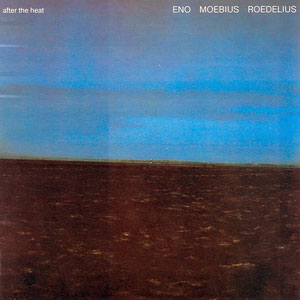
After the Heat is a 1978 album by Brian Eno, Dieter Moebius and Hans-Joachim Roedelius, credited to "Eno Moebius Roedelius". The album represents the second collaboration by the trio, the first being 1977's Cluster & Eno. As with the previous album, After the Heat was created in collaboration with the influential krautrock producer Conny Plank.
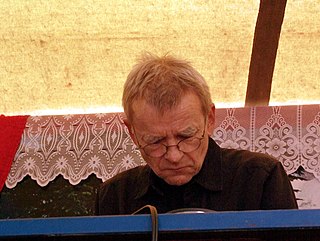
Dieter Moebius was a Swiss-born German electronic musician and composer, best known as a member of the influential krautrock bands Cluster and Harmonia.
Kluster was a Berlin-based German experimental musical group formed in 1969 by Hans-Joachim Roedelius, Conrad Schnitzler, and Dieter Moebius. Their improvisational work presaged later industrial music. The original Kluster was short-lived, existing only from 1969 until mid-1971 when Conrad Schnitzler left and the remaining two members renamed themselves Cluster. Schnitzler later revived the band from 1971 to 1973 and then from 2007 until his death in 2011.

Begegnungen is a Sky Records 1984 collection of music by Brian Eno, Dieter Moebius, Hans-Joachim Roedelius and Conny Plank, compiled from these seven solo and collaborative albums released by Sky between 1976 and 1983:

Begegnungen II is a Sky Records 1985 compilation album with recordings by Brian Eno, Dieter Moebius, Hans-Joachim Roedelius, Conny Plank, Cluster, from solo albums, and from various collaborations between the artists. All of the tracks had been previously released elsewhere. The albums these tracks were drawn from are: Material by Moebius & Plank, Zero Set by Moebius, Plank, Neumeier, Durch Die Wuste and Lustwandel, both Roedelius solo albums, After The Heat by Eno, Moebius, Roedelius, Tonspuren, the first solo album by Moebius, Sowiesoso by Cluster, and the eponymous Cluster & Eno. These albums were released by Sky between 1976 and 1983.

Großes Wasser is the seventh album by the electronic music outfit Cluster. It was co-produced by former Tangerine Dream member Peter Baumann. Großes Wasser marked the return to Cluster working as a duo of Hans-Joachim Roedelius and Dieter Moebius after two albums collaborating with Brian Eno.
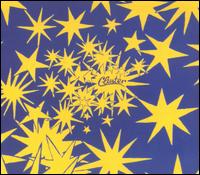
Cluster II is the second full-length album by German electronic music act Cluster, released in 1972 by record label Brain.

Zwei-Osterei is the second full-length album by German experimental music trio Kluster. The album title translates to English as "Two - Easter egg".
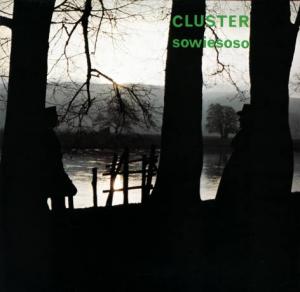
Sowiesoso is the fourth studio album by German electronic music band Cluster, released in 1976. It was Cluster's first release for Sky Records. Sowiesoso was recorded in just two days in Forst, Germany in 1976 and mixed at Conny's Studio in Wolperath.
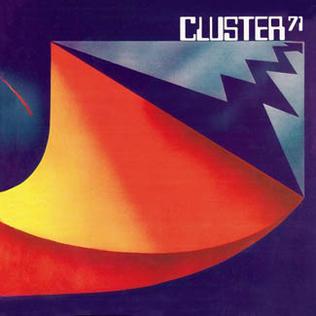
Cluster is the debut studio album by German electronic music outfit Cluster. It was recorded in 1971 and released the same year by record label Philips. It is also the only album on which producer Conny Plank is credited as a member.

Deluxe is the second album from the West German krautrock group Harmonia, featuring Neu! guitarist Michael Rother with the duo Cluster. It was recorded in June 1975 in Harmonia's studio in Forst, Germany. It was first released on the Brain Records label in 1975.
Moebius & Plank was a German electronic music duo consisting of musicians Dieter Moebius and Conny Plank. They recorded three albums between 1979 and 1986 as well as two additional albums, one a collaboration with Mani Neumeier and the other with Mayo Thompson. Plank died of cancer in 1987. Their final two albums were released posthumously in 1995 and 1998 respectively

Rastakraut Pasta is the first full-length album by German electronic music duo of Dieter Moebius and Conny Plank.

En Route is the fourth full-length album released by German electronic music duo of Dieter Moebius and Conny Plank. It was actually the fifth and final album recorded before Plank's death in 1987. En Route was recorded in 1986 at Conny's Studio outside of Cologne. As Plank's health deteriorated the recordings were left incomplete. The album was completed and mixed by Moebius & Gebhard. The 11th through 13th tracks on the CD are remixes by Manu Guiot done in 1995. It was released by the Dubuque, Iowa-based Curious Music label in 1995.

Durch die Wüste is the first full-length solo album by German keyboardist Hans-Joachim Roedelius, best known for his work with Cluster, Harmonia, and Aquarello. The title is German for "Through the Desert."

Zero Set is the only album by the German electronic music trio of Dieter Moebius, Conny Plank, and Mani Neumeier. It followed two collaborations by Moebius & Plank as a duo. Zero Set was recorded in September, 1982 at Conny's Studio outside Cologne, and released by Sky Records in 1983.

Ludwig's Law is the one and only album released by trio of Dieter Moebius, Conny Plank, and Mayo Thompson. It was actually the fourth album recorded by the team of Moebius & Plank. In 1983 the duo recorded a series of electronic tracks using an Emulator, an early form of sampling keyboard that enabled them to duplicate other instruments without having to deal with the musicians who played them. Mayo Thompson of Red Krayola recorded a series of monologues and vocal tracks which were added to the music Moebius & Plank had recorded. According to the Earpiece website "topics include the fate of chickens owned by a 'farmer gabriel' and the effect of lack of sunlight on human intelligence." Sky Records, which had released the first three Moebius & Plank album, rejected the master and Ludwig's Law was relegated to the vault. It was finally released on November 16, 1998 on the Drag City label.

















